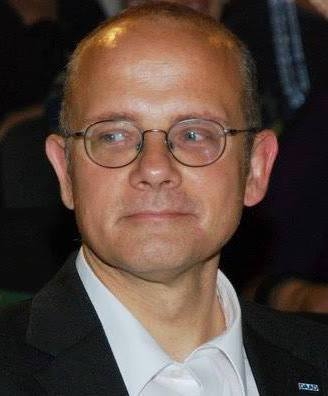A straightforward political interpretation of the incident is not an easy task. The Russian nationalists labelled their Ukrainian counterparts "fascists." That is a not entirely inappropriate label for the members of "Svoboda" - an organization that has grown out of the manifestly ultra-nationalist Social-National Party of Ukraine. Some of the "Svoboda" demonstrators, at their Sevastopol march, raised their arms in the Roman salute, as used once by the NSDAP and today by neo-Nazis worldwide. However, the pro-Russia counter-demonstrators, according to a report by "Sevastopol Life," also included activists from the Vitrenko Bloc. This grouping's leader, Natalia Vitrenko, has for several years been in an open alliance with Russia's so-called International Eurasian Movement. The Eurasian Movement's leader, Alexander Dugin, in turn, has repeatedly eulogized fascism in general, and the Waffen-SS in particular. The neo-Eurasianist leader once praised SS Obegruppenfuehrer Reinhard Heydrich, the Holocaust's initial organizer, as a "convinced Eurasian." Dugin has made many similar statements, and it is difficult to believe that Vitrenko and her entourage have not noticed his fascist inclinations. This makes the Vitrenko people's use of "fascism" as a derogatory term for their Ukrainian opponents sound odd.
Whatever the exact meaning of the incident, similar future events are probable, especially on the Crimean peninsula. In the worst case, they could get out of control and provoke bloodshed. In both Ukraine and Russia, there are politicians and political groups who, for domestic reasons, would benefit from such an escalation. To be sure, most Ukrainian and Russian citizens would be horrified by the idea of a violent confrontation between their co-nationals. Yet, a small circle of determined extremists, whether within Russia or Ukraine, may be able to succeed in provoking such an escalation - especially if the confrontation, such as the last one, contains pro-fascist activists on both sides.
What would be the repercussions of bloodshed? In Russia and to a lesser degree in Ukraine, many would feel it necessary to react decisively. One can easily imagine the president, prime minister or pseudo-parliament of Russia issuing yet more offensive statements concerning the Ukrainian nation state and political class. Worse, in both Russia and Ukraine, state and party officials might start engaging in public debate on how to respond appropriately to violence in Sevastopol or elsewhere. If this triggered a "patriotic bidding war" between politicians trying to demonstrate superior allegiance to the supposed national interests of their countries, it would sooner or later include the discussion of a military "solution." Both Russian and Ukrainian politicians may, in principle, understand that the deployment of troops would not result in decisive victory for either side. Yet, emotional public debates in Russia on how to properly "protect" ethnic Russians in Crimea, or an outburst of patriotism by Ukrainians worried about the sovereignty of their young state, would put pressure on both countries' commanders-in-chief. It might create a dynamic that could supersede rational calculations of the actual pros and cons of military intervention. At least Russia has, in Georgia, shown that it has no qualms about rapidly deploying regular troops beyond its borders in order "to protect" people whom it regards as "Russia's own" and perceives as being physically threatened.
Russia, too, should not have any illusions. True, it has a large conventional army, is a nuclear superpower, and would be the more likely "winner" of such a war (though "victory" would surely not come as easily as in Georgia). Russia may even be able to "re-unite" with Crimea. Yet, such a military "success" would be costly, on the international scene. While Russia has partially succeeded in portraying one unfriendly post-Soviet leader, Mikheil Saakashvili, as a "madman," it would be more difficult to convince the world that yet another democratically-elected post-Soviet government is "mad" as well. Whatever spin Russia's political technologists may come up with, most people around the world would start thinking that the real "madmen" sit in Moscow, rather than Tbilisi or Kiev.
A Russian-Ukrainian war would also trigger a full-scale second Cold War with the West, with effects on economic relations, cultural exchange, travel freedom, etc. The EU-Russia summits, the 2014 Winter Olympics in Sochi, Russia's membership in the Council of Europe, Russian participation in the Eurovision contest - these and many more joint events, common projects and Russian-Western links would be put into question. The International Criminal Court may, as in the case of Serbia's former leadership, issue arrest warrants for Russian leaders.
Moreover, after the de facto annexation of South Ossetia and Abkhazia, a second territorial expansion of Russia would prompt the leaders of such countries as Belarus, Kazakhstan or Uzbekistan reconsider their alliances with Moscow. These and other Russian allies in Europe and Asia were already conspicuously silent during and after the Russian-Georgian conflict in August 2008. None of them has recognized either Abkhazia or South Ossetia's "independence." Another intervention on the territory of a Russian neighbor may let even those few international partners that Moscow still has today look for security and cooperation elsewhere. In a war in Crimea, Russia may, after the death of thousands of Russians and Ukrainians, be able to "get back" its treasured peninsula. But the price it would have to pay would be far-reaching international isolation, for years if not decades to come.
While these scenarios sound fantastic today, they are feasible once bloodshed has started. As groups who benefit politically from increasing Russian-Ukrainian animosity are on the rise in both countries, the likelihood of the situation escalating in- rather than de-creases. Against this background, the leaders of both Russia and Ukraine should keep reminding themselves what military intervention from either of them would eventually lead to.





